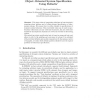Free Online Productivity Tools
i2Speak
i2Symbol
i2OCR
iTex2Img
iWeb2Print
iWeb2Shot
i2Type
iPdf2Split
iPdf2Merge
i2Bopomofo
i2Arabic
i2Style
i2Image
i2PDF
iLatex2Rtf
Sci2ools
150
click to vote
ISKI
1994
1994
Object-Oriented System Specification Using Defaults
This paper aims at integrating techniques of non-monotonic reasoning about updates and of object-oriented specification of information systems. We present how to utilize defaults in specifications of dynamic system behaviour. Thus overridable rules may be used in specifications which deal not only with state structures, but also with state transitions and sequences. Systems are viewed as societies of interacting objects. The underlying object specification logic is based on temporal logic and allows to refer to the enabling and occurrence of actions. It is extended with prioritized defaults and module composition. By discussing a variety of examples, we study which default patterns should be used for typical problems of behavioural specification.
Information Systems | ISKI 1994 | Object Specification Logic | Object-oriented Specification | Specification |
Related Content
| Added | 10 Aug 2010 |
| Updated | 10 Aug 2010 |
| Type | Conference |
| Year | 1994 |
| Where | ISKI |
| Authors | Udo W. Lipeck, Stefan Brass |
Comments (0)

